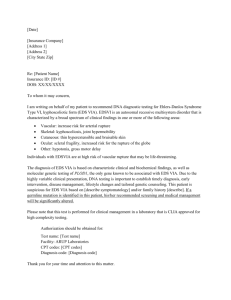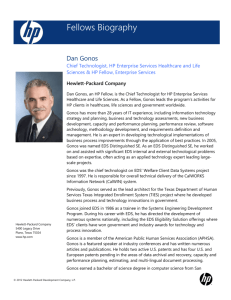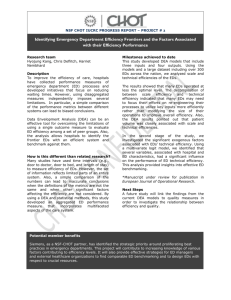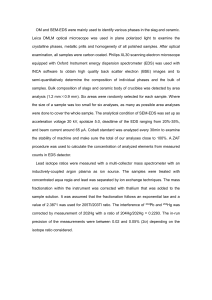How the benefit system affects someone with EDS, with a particular
advertisement
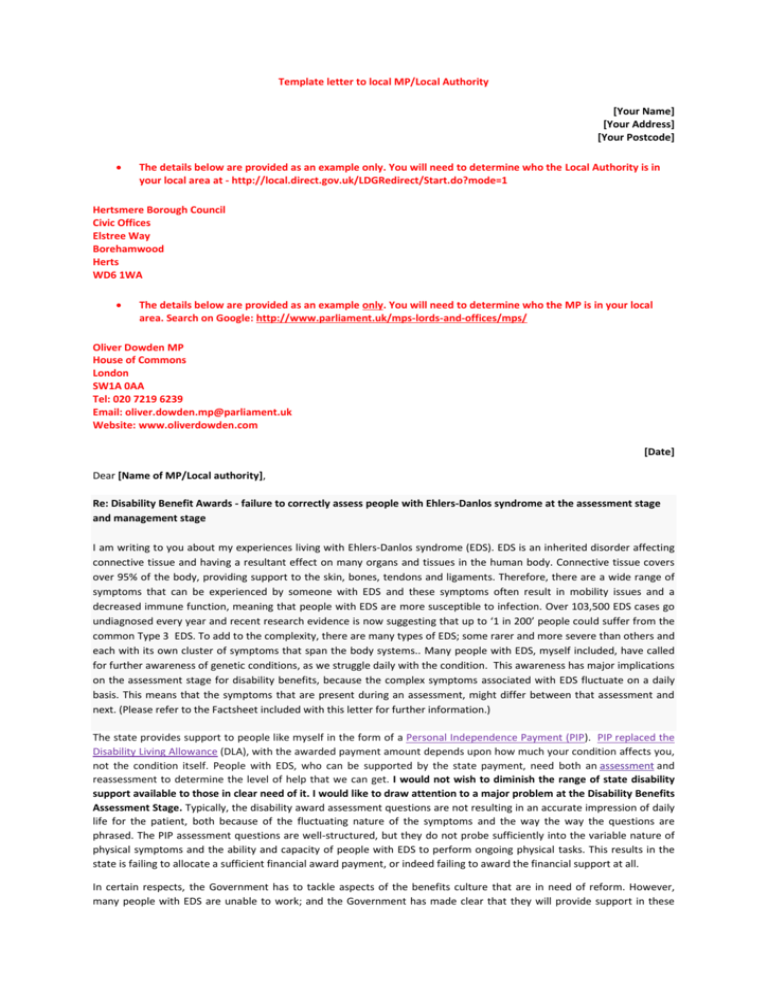
Template letter to local MP/Local Authority [Your Name] [Your Address] [Your Postcode] The details below are provided as an example only. You will need to determine who the Local Authority is in your local area at - http://local.direct.gov.uk/LDGRedirect/Start.do?mode=1 Hertsmere Borough Council Civic Offices Elstree Way Borehamwood Herts WD6 1WA The details below are provided as an example only. You will need to determine who the MP is in your local area. Search on Google: http://www.parliament.uk/mps-lords-and-offices/mps/ Oliver Dowden MP House of Commons London SW1A 0AA Tel: 020 7219 6239 Email: oliver.dowden.mp@parliament.uk Website: www.oliverdowden.com [Date] Dear [Name of MP/Local authority], Re: Disability Benefit Awards - failure to correctly assess people with Ehlers-Danlos syndrome at the assessment stage and management stage I am writing to you about my experiences living with Ehlers-Danlos syndrome (EDS). EDS is an inherited disorder affecting connective tissue and having a resultant effect on many organs and tissues in the human body. Connective tissue covers over 95% of the body, providing support to the skin, bones, tendons and ligaments. Therefore, there are a wide range of symptoms that can be experienced by someone with EDS and these symptoms often result in mobility issues and a decreased immune function, meaning that people with EDS are more susceptible to infection. Over 103,500 EDS cases go undiagnosed every year and recent research evidence is now suggesting that up to ‘1 in 200’ people could suffer from the common Type 3 EDS. To add to the complexity, there are many types of EDS; some rarer and more severe than others and each with its own cluster of symptoms that span the body systems.. Many people with EDS, myself included, have called for further awareness of genetic conditions, as we struggle daily with the condition. This awareness has major implications on the assessment stage for disability benefits, because the complex symptoms associated with EDS fluctuate on a daily basis. This means that the symptoms that are present during an assessment, might differ between that assessment and next. (Please refer to the Factsheet included with this letter for further information.) The state provides support to people like myself in the form of a Personal Independence Payment (PIP). PIP replaced the Disability Living Allowance (DLA), with the awarded payment amount depends upon how much your condition affects you, not the condition itself. People with EDS, who can be supported by the state payment, need both an assessment and reassessment to determine the level of help that we can get. I would not wish to diminish the range of state disability support available to those in clear need of it. I would like to draw attention to a major problem at the Disability Benefits Assessment Stage. Typically, the disability award assessment questions are not resulting in an accurate impression of daily life for the patient, both because of the fluctuating nature of the symptoms and the way the way the questions are phrased. The PIP assessment questions are well-structured, but they do not probe sufficiently into the variable nature of physical symptoms and the ability and capacity of people with EDS to perform ongoing physical tasks. This results in the state is failing to allocate a sufficient financial award payment, or indeed failing to award the financial support at all. In certain respects, the Government has to tackle aspects of the benefits culture that are in need of reform. However, many people with EDS are unable to work; and the Government has made clear that they will provide support in these specific instances. Investment in medical training about EDS – including during the first-phase training, such as medical school - has historically been poor, resulting in diagnostic problems long before the later management stages of the disability benefits process. A benefit assessment misallocation can be a frequent result of this, either out of direct misunderstanding of correctly-diagnosed EDS symptoms and their impact; or a prior incorrect diagnosis of another condition, such as ME or Fibromyalgia. People with ME and Fibromyalgia can experience more robust overall health and greater physical mobility than someone with EDS. If EDS is misdiagnosed with one of these conditions, a frustrating series of events can unfold, including both an unjustified and unreasonable failure at a benefits assessment and unnecessary physical pain for the patient. A failed assessment, for whatever reason, can further create a sense of marginalisation for the patient and serious mental health problems, such as depression and anxiety disorders. There are many members of the EDS Community devastated by an unfair assessment and regrettably embarking on an appeal via the Tribunal System. This creates a further unnecessary misallocation of resources in the legal system, wasting a great deal of time and money in process and paperwork. It causes stress for both the EDS sufferer and the assessment panel and can further burden an already overstretched mental health system, damage the personal finances of the patient and a impose a cost on the state, such as prescribed anti-depressant medication. [Add any personal experiences about the issue here. Make sure to keep sentences concise and to the point.] If you could raise awareness of this issue by educating the officials within Department for Work & Pensions and within local medical bodies, then we can increase the chances of both an accurate diagnosis and more importantly correct assessment of the need for state support at first stages of the health service. In the long run, this will lead to a good deal less waste and inefficiency within several sectors of the economy that the Conservative Party are stating are in clearly in need of reform and will improve the quality of life for people with EDS. Making combined improvements to the benefits assessment process and the diagnostic/post-diagnostic process will contribute to the Conservative Government’s efficiency-lead objectives. The positive impact of this could be felt upon the Health Service, The Benefits System and the Labour Market. The ideas behind the ‘Big Society’ can be also be demonstrated at a local and national level by this approach. In certain cases, more can be done to increase access to work in EDS cases; but only for those that are able to work and at all times sensitive to their debilitating condition. In a number of cases there is a clear need for long-term state support. Greater investment can be directed to support other opportunities available to improve quality of life such as education and training opportunities for those with EDS who are both ‘unable’ and ‘able’ to work. Please give strong consideration to these points; in particular, the multiple benefits, efficiency gains and value-for-money that could be reaped, not only by constituents/local citizens with rare health conditions, but also the health service, the legal system and the benefits system on an aggregated level. In anticipation of your response [Your name and contact info]
